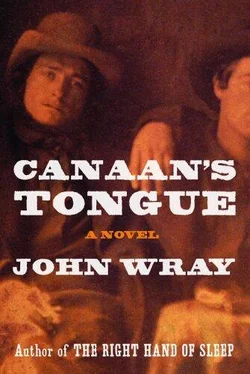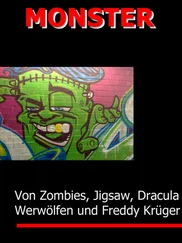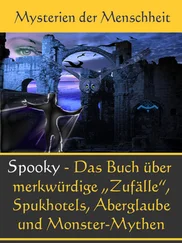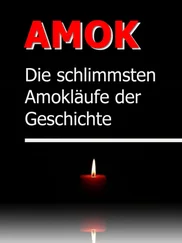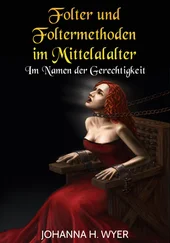What, to liberate em? says T.M., frowning.
Harvey hops and titters. You heard rightly! Every ounth of plucked cotton up the old River Jordan. Fare thee well, ye thport of thpring and nature. .
You must be off your parsnips, Goodie boy, says I.
True ath I live and breathe. Thomething about puckerth in their thkin. Harvey rubs his face. Thinkth blackneth ith an ailment. Or the cure for one. Taketh cuttingth from ’em.
He what? says T.M.
Harvey nods. Cuttingth, he says again. He did all manner of fiddling, and now he’th decided to let ’em go. But not out of brotherly good-feeling, mind—: he’th afeared of them. He told me.
So he’s no liberationist, then, says I.
Elbow -litionist, Stuts, T.M. says. He goes quiet for a bit. Well, Mr. Harvey—; I would recommend—
I reckon we could thell ’em, Harvey whispers. The lot. Up in Memphith, maybe. Or Natchez.
I look down at the cups in front of me. Seven wet cups in a row.
That’s D’Ancourt’s godson, says I. The old Colonel who drinks down at Cheney’s. He’ll not be very keen.
He’ll be keen ath a cricket, says Harvey. I know him.
T.M. tips his head back and lets out a cluck. Harvey! says he. You’re forgetting Trist senior. You think old Sam Trist can’t keep count of his niggers?
If he can’t, there’s plenty on his payroll knows better, says I. There’s no way we could peddle those niggers and live.
Tritht would put a bounty on em, that’th all, Harvey says. We thell ’em here and there, one or two niggerth at a time. Around Memphith. In the townth.
Or take them back to Daddy Trist and collect the bounty on them ourselves, a voice says from the corner booth.
Goodman, I believe you know our Parson, says T.M.
Harvey suckles on his beer for a time. I know him, says he.
T.M. has his head cocked toward the booth. Would it work?
But the old bogey is done for talking. T.M. turns it over for a spell.
Mister Harvey, says he. Run along to your nutter and ask him when he’d like to loose his niggers on the world.
THE RUN TO MEMPHIS ENDED IN A BUTCHERY, Virgil says. It cured me of airs and fancy clothes forever.
We weren’t three hours out of 37 when a commotion started up in the front hold. It was pitch-dark already—: aside from Trist, asleep beside me on the pilot’s bench, I was entirely alone. I called for Ziba Goss and Parson, listened a moment, then called out again. Neither answered. The noise from the hold carried up in swells, now harsh and cutting, now strangely musical and mild—; within a quarter-hour I was desperate to know its cause. I resisted my curiosity as best I could, knowing the danger of giving the wheel over to Trist. It was not uncommon, after all, for the niggers to sing or pray together on a run. But this was neither the sound of singing nor of prayer—: it was a small noise, solitary and beseeching, that rose every so often into a chorus, then quickly fell away to nothing. At times it was so unearthly, so melancholy, that I questioned whether it was made by human tongues at all.
Soon I could no longer bear not knowing. Shaking Trist awake, I propped him up behind the wheel, ordered him to keep us hard into the current, and left him to the questionable charity of the river.
That was the first of my mistakes that night. I was fated, within the hour, to make two more.
I stepped out onto the star-lit deck and listened. No sound could be heard but the hissing and stuttering of the boiler. I felt my way along the rail to the front hold, listened another moment, then pressed my ear against its cast-iron shutters. For the space of a breath I heard nothing but the churning of the current—: then the current seemed to hush, the sound from the hold came up terrible and clear, and I was running back to the pilot-house as fast as my legs would carry me.
A man was being tortured in the hold. I had a trap-door Derringer in my vest pocket, little or no confidence in its kick, and none at all in my ability to put the fear of God into a boat-ful of death-crazed niggers. Such things fell under Parson’s jurisdiction. I shouted his name, and Ziba’s, again to no avail. Where in heavenly blazes had they gone? Were they still on board at all? Had they perhaps heard the sound in the hold themselves, weighed its credits and its debits, and jumped head-first into the river?
I found Parson soon enough, as it happened, but it brought me little comfort. He was leant stiff as a musket behind the boiler-house door. I lit a match and held it toward him—: he neither twitched nor blinked nor shed a tear. His face was ungiving to the touch, like a plaster-of-paris mask—; for his final, immortal expression he’d selected a thin-lipped leer. That was not all, however. His tongue protruded a good half-inch from his mouth, slack and slate-colored and fat, like the tongue of a yellowjack victim.
At the sight of that tongue I lost my last crumb of composure. I screamed and cursed and abused Parson’s name every way I could think of, jumping up and down in front of him, slapping him, throttling him, shaking him back-and-forth by the collar. Parson remained effortlessly status quo. The sound from the hold was eclipsed, for the time being, by the workings of the boiler, and by my tantrum—; but the idea of the sound was more terrible than the sound itself. I screamed Parson’s name one last time — I could think of no worse insult — and left him as he was.
When I returned to the pilot’s house the sound was shriller than before, more plaintive, more severe. I couldn’t stand it another instant. I knew better than to send Trist down, and I’d found no sign of Ziba—: for all I knew Parson had swallowed him alive. There was no commandment set down in the scriptures of the Trade, of course, that the cargo need be ministered to at all, let alone at night-time, out in the black middle of the river, under a topping head of steam. But I was not interested in the Trade and its protocols just then. I was not acting out of sympathy, or humanity, or even out of fear—: I was spurred on by my hatred of that noise, by a passionate desire to kill it off, and by a curiosity that admitted neither of caution nor delay. I had good reason to hurry. Acting in concert, even a dozen men could easily have forced the hatch—; I’d seen it done before. This, at least, was the rationale I gave myself while I fumbled with the padlock and the bolt. I was to repent it bitterly, and soon.
When the bolt slid open the sound stopped short, leaving a sudden vacancy in the air, as though a piano-wire had snapped. A humid silence met me as I raised the hatch, broken only by a rasping — or a wheezing, better said — in the far corner of the hold. The smell of piss and sweat and excrement seized me by the throat and commenced to wring the breath out of me slowly. A step-ladder extended two rungs downward, perhaps three, before vanishing into darkness. The stench and the dampness and a steady tightening of my bowels, as though in anticipation of a blow, were all there was to tell me I was being watched by two-score pair of eyes.
I could not say how long this spell of quiet lasted. Finally there was a scuffling below me, and a single clap of hands—; then a low, easy whisper of command that frightened me worse than all the rest combined.
“We at yin chopping-block yet, Savior?” a voice said mellowly.
“What’s your name?” I called down. My own voice seemed grotesquely high and quavering.
A silence. “John yin Baptist,” the voice said at last.
“You take this, Johnny, and you light it,” I said, throwing down a match and a candle-stub.
This was my third error of the night.
A dull click followed, as of a jack-knife being opened—; then a scraping along the bottom of the hold. The match flared to life and was brought up to the candle. So dark was the hold, so much darker even than the night outside, that the match-flame all but blinded me. When I recovered my sight, I was dumbfounded by what I saw—: no more than an arm’s length down the ladder, near enough to touch, two dozen head stood crushed together like kippers in a jar. A white-haired titan of a man stood just below me, balancing the candle on his left shoulder and watching me out of bolt-steady, ginger-colored eyes.
Читать дальше
